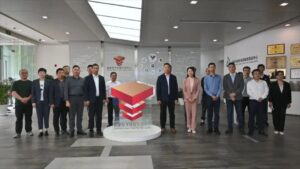From today onwards, China enters the "two sessions time". The Fourth Session of the Twelfth National Committee of the Chinese People's Political Consultative Conference (CPPCC) and the Fourth Session of the Twelfth National People's Congress (NPC) will open in Beijing on the 3rd and 5th, respectively.
This year is the beginning of the decisive stage of building a moderately prosperous society in all respects, therefore, at this year's two sessions, will not only consider the government work report, but also review the "13th Five-Year Plan". Since last year's eighteenth session of the Fifth Plenary Session of the introduction of the proposed draft outline, "13th Five-Year Plan" is the focus of attention from all walks of life. Specifically, what are the important agendas and key topics expected to be discussed at this year's sessions? We'll sort it out for you.
What hot words are expected at this year's two sessions?
"The 13th Five-Year Plan and the Five Development Concepts
The "13th Five-Year Plan" is undoubtedly one of the key hot topics of the two sessions this year. At the end of October last year, the Fifth Plenary Session of the Eighteenth Central Committee adopted the proposed 13th Five-Year Plan, which clearly defines the blueprint for China's development over the next five years. One of the important agendas of this year's NPC session is to review and approve the outline of the 13th Five-Year Plan.
Compared with the draft recommendations, the outline plan is more detailed and the indicators are more clearly defined. "What are the features of the Thirteenth Five-Year Plan as compared with the previous plan? How do the indicators of work for the next five years break down? How to implement the five development concepts of innovation, coordination, green, openness and sharing (from the local two sessions, several provinces mentioned that they will adhere to and implement the five development concepts in their government work reports)? How to ensure that the economy maintains a medium to high rate of growth and that the standard and quality of living of the people generally improve? How will the central government detail the tasks to be deployed in specific areas to ensure that a moderately prosperous society is built in all respects by 2020? The two sessions will reveal the answers and are worth waiting for.
Economic growth rate
Every year, the presentation of the economic growth rate in the government work report of the two sessions will trigger widespread attention at home and abroad, and I'm afraid this year will be no exception.
At present, the economic downward pressure is relatively large, Premier Li Keqiang once said that the economic growth rate out of a reasonable range will take decisive measures, to swing the golden rod to deal with. According to the previous "13th Five-Year Plan" draft proposal, by 2020 to double the 2010 target, the next five years GDP growth rate can not be less than 6.51 TP1T. Therefore, this year's economic growth target will be set at how many let us wait and see.
Supply-side reform has been a hot word in the financial sector lately. From the 11th meeting of the Central Financial and Economic Leading Group in November last year, Xi Jinping, General Secretary of the Central Financial and Economic Supervisory Group, proposed for the first time to "focus on strengthening supply-side structural reform", to the end of February this year, the People's Bank of China lowered the credit rating to create a suitable monetary and financial environment for supply-side structural reform....... Side reform has become an important task in the 13th Five-Year Plan period.
But how to promote supply-side reform, so that production capacity and demand to match more is not an easy thing, which involves the adjustment of industrial structure, but also involves the allocation of resources and adjustment of interests, how the representatives of the members of the committee to contribute their insight is worthy of attention.
The current property market can be said to be a fire and ice, the property market in first-tier cities continue to be hot, prices show a jump in trend; but three or four cities are still facing enormous pressure to reduce inventory, prices stagnate, according to data released by the National Bureau of Statistics, Liaoning Jinzhou and Zhanjiang, Guangdong and other cities, prices are still declining in January this year.
In order to inventory, the country has introduced a series of policies, down payment down to 20%, lowering the deed tax and business tax, CPF to purchase houses in different places and other measures have been introduced, but the effect of these measures when implemented in various places is not the same. Industry insiders believe that stable housing consumption is of great importance to stabilize growth and promote urbanization. But how to make the regulation more accurate power, on the one hand, to drive the third and fourth tier cities to inventory, at the same time, the first tier city prices are not to rise, these issues are also highly concerned by the community. In addition, whether the property tax is also a major hotspot, because some people believe that the property tax is a powerful tool to curb rising prices.
Over the past year, China's capital markets have been in sharp turmoil, and Premier Li Keqiang has said that relevant lessons must be learned, including on the regulatory front. We are very concerned about how to reform the regulatory system. For example, in China's current financial regulatory system, there are "one line and three councils" (the People's Bank of China and the Securities Regulatory Commission, the Insurance Regulatory Commission and the China Banking Regulatory Commission), which is a typical branch of supervision. However, with the rapid development of Internet finance, the phenomenon of cross-industry financial development is increasing. How to strengthen coordination among financial administrations, prevent financial system risks, and promote financial development to better serve the real economy deserves attention.
In addition, a two-year reform of the registration system, which the National People's Congress authorized the State Council to carry out starting in March, has come into effect. How the securities issuance registration system reform is bound to raise high concern. Before the two sessions, the chairman of the securities regulatory commission has just been replaced, Liu Shiyu replaced Xiao Gang in charge of the securities regulatory commission, this is the new chairman's first appearance in the two sessions, how will he interact with the media?
What kind of supporting measures will be introduced after the full two-child policy is implemented this year? At present, although it is possible for many people to have a second child, many people are not necessarily willing to have a second child because the cost of raising a child is not low, and the "conflict between supply and demand" in obstetric and pediatric health care is also becoming more pronounced.
The National Health Planning Commission held a press conference on February 24, revealed that every thousand 0-14 year old children in China corresponds to the number of pediatric practice (assistant) physicians 0.53, that is, the emergence of "a thousand children and a half doctor" situation, and the major tertiary hospitals have emergency obstetrics, the number of high-risk maternity showed an upward trend. In addition, for those who had a second child before the release of the two-child policy and have not yet been registered, how can they be registered? Will social support payments continue? How? These issues are also expected to be a hot topic of discussion among the delegates.
anti-corruption
Anti-corruption is a hot topic that has continued to receive attention in the past few years, with the end of last year's National People's Congress (NPC) meeting on the day that the Yunnan provincial party committee deputy secretary Qiu He was taken away, showing the strength of the fight against corruption. This year, the two sessions, how to promote anti-corruption is also the hotspot of concern from all walks of life.
In 2016, how will we adhere to the overall strict governance of the Party, rule the Party in accordance with the rules and regulations, and further promote the construction of the Party and the fight against corruption? How will the fight against corruption be consolidated, the long-term mechanism for improving working styles be improved, and efforts be made to build an institutional mechanism that dares not, cannot and does not want corruption? At present, the ninth round of central inspection has been launched, some inspection groups have been stationed in the inspected units, there are four provinces by the inspection group "look back". By then, how will these inspected units respond to the media's questions? Whether it's a global issue at the macro level or a local issue specific to a unit, new developments and trends in the fight against corruption will certainly be the focus of public interest.
"During the 13th Five-Year Plan period, there are five major development concepts, including the green one. "Green water and green mountains are mountains of silver and gold" has become a social consensus, but the reality is still far from this goal, and the problem of smog that surrounds the city in winter has not been fundamentally reversed.
In the current economic downturn, is it still necessary to sacrifice environmental management for economic growth? During the two sessions last year, Minister of Environmental Protection Chen Jining, who had just recently assumed his new post, impressed everyone with his professionalism at the press conference. By this year, the Paris climate conference had reached an agreement to reduce emissions. In addition, Beijing officials have confirmed that they will blow the smog by creating urban breezeways, which has sparked heated debate. Faced with old problems and new situations in the field of environmental protection, what will the delegates as well as policy-making officials say?
Last year was the inaugural year of promoting the rule of law in an all-round manner, and various reforms in the judicial field are being carried out one after another, with some cases of high social concern, such as the Chen Man case, receiving heavy sentences.
However, how to prevent unjustified and false cases and eradicate judicial corruption at source is not only a matter of social justice, but also a matter of the confidence of all sectors of society in the administration of justice. In this regard, the report of the "Two Highs" is worth looking forward to.
At the end of last year, some media had reported the news that a tax reform related plan had been introduced. Finance Minister Lou Jiwei has also said on several public occasions that the direction of tax reform is to shift from the current categorical tax system to a comprehensive and categorical tax system.
At present, it has become a social consensus to reduce the individual tax burden of taxpayers, but the question now is how to reduce the individual tax. In fact, there are only the following ways to reduce the burden of individual tax: raising the individual tax threshold, which is relatively simple, but the problem is equally obvious. The other is to change from an individual as a unit to a family as a unit levy, or is to increase the scope and amount of tax credit, this approach is more fair and reasonable, but the operation is more difficult. In this year's two sessions, it is worth looking forward to see if there is any progress in the reform of the individual tax.
Of course, in addition to the above-mentioned eight major topics, attention is also very high on topics such as delayed retirement, health insurance reform, pensions as well as SOE reform, employment and income growth. However, in response to the issue of delayed retirement, Yin Weimin, the Minister of Social Affairs, had already said before the two sessions that relevant proposals would be introduced this year and solicited opinions. At the same time, he also focused on responding to topics such as employment, health insurance and income growth, which have been adequately covered so far and are expected to be discussed during the two sessions this year, but I won't go into detail here.
What are the important agendas for the 2016 sessions?
In accordance with the decision of the Standing Committee of the National People's Congress of December 27, 2015 to convene the Fourth Session of the 12th National People's Congress, it is proposed that the agenda of the meeting be.
-
Consideration of reports on the work of the Government.
-
Reviewing and approving the thirteenth five-year plan for national economic and social development.
-
To review and approve the report on the implementation of the National Economic and Social Development Plan for 2015 and the draft National Economic and Social Development Plan for 2016, and to approve the National Economic and Social Development Plan for 2016.
-
Reviewing and approving the reports on the implementation of the central and local budgets for 2015 and the draft central and local budgets for 2016, and approving the central budget for 2016.
-
Consideration of the bill of the Standing Committee of the National People's Congress on submitting the draft Charity Law of the People's Republic of China for consideration.
-
Consideration of the report on the work of the Standing Committee of the National People's Congress.
-
Consideration of the report on the work of the Supreme People's Court; consideration of the report on the work of the Supreme People's Procuratorate.
-
In accordance with past practice, the Fourth Session of the Twelfth National Committee of the Chinese People's Political Consultative Conference will hear and consider the report on the work of the Standing Committee of the CPPCC, attend relevant meetings of the National People's Congress, and listen to and discuss the report on the work of the Government and other relevant reports.
-
In addition to the aforementioned important agenda, a number of press conferences will be held during the two sessions each year, with the heads of ministries and commissions answering questions on hot topics of public interest.
-
During the two sessions last year, a total of 11 ministries and commissions, including the National Development and Reform Commission (NDRC), Ministry of Finance, Ministry of Agriculture, Ministry of Commerce, Ministry of Environmental Protection, Ministry of Foreign Affairs, General Administration for Industry and Commerce, Ministry of Human Resources and Social Security, General Administration of Security, Ministry of Science and Technology, and the Central Bank, attended the press conference.




